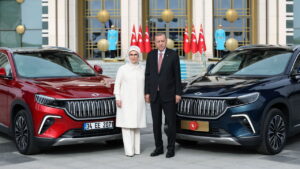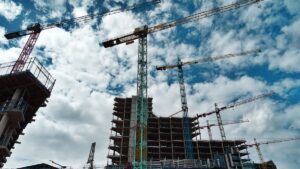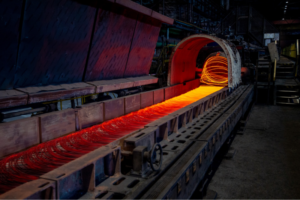
Global chip sales in August increased 21.7% from the same month last year to $64.88 billion, according to a press release from the Semiconductor Industry Association (SIA). Compared to July, the rebound was 4.4% (from a revised $62.14 billion).
“Global semiconductor sales continued to rise in August. Asia-Pacific and the Americas continue to drive the rebound, with particularly strong growth in memory and logic chip sales,” said SIA President and CEO John Newfer, quoted in the report
Sales in the Americas in August were up 25.5% year-over-year, with China up 12.4%, Europe up 4.4%, and Asia-Pacific and other regions up 43.1%. At the same time, a 6.9% decrease was recorded in Japan.
Chip sales relative to July increased in the Americas by 4.3%, in APAC by 6.9%, in the PRC by 3.3%, in Japan by 2%, and in Europe by 1%.
SIA represents about 99% of the U.S. semiconductor industry and about 66% of chip makers from other countries.

Turkish electric car manufacturer TOGG (Türkiye’nin Otomobili Girişim Grubu) has announced its entry into European markets and the introduction of new digital solutions, including the option to pay for cars with cryptocurrency, according to Autogeek.
According to the report, the company plans to open its first showrooms in Germany, the Netherlands, and Switzerland in 2025, as well as begin sales in other EU markets.
TOGG has already introduced the T10X electric crossover in Europe, which will be the brand’s first mass-produced export vehicle.
Buyers will have access to the innovative digital platform “Trumore,” through which they can place an order, select a configuration, and pay for their purchase — including using cryptocurrency or tokens issued within the TOGG ecosystem.
According to the company’s management, the integration of blockchain payments reflects its digitalization strategy and opens up new opportunities for users by combining electric mobility, fintech, and smart infrastructure.
“We are not just building a car, but a digital ecosystem where transportation, communications, and finance are combined into a single platform,” said TOGG CEO Gürcan Karakaş.
The company already produces electric vehicles at its plant in Gemlik (Bursa province). Production capacity is designed for 175,000 cars per year, with plans to increase this to 1 million units by 2035.
TOGG sees its entry into Europe as a strategic step towards promoting Turkish technology and integrating into the EU market.

The construction sector continues to suffer from a shortage of personnel, which forces companies to offer specialists competitive conditions and raise salaries to guarantee the continuation of construction projects, Ukrainian developers told Interfax-Ukraine.
“Due to the outflow of some specialists abroad and internal migration, it is becoming increasingly difficult to find the right specialists. This creates additional challenges for employers, but at the same time stimulates an increase in labor remuneration. As a result, the construction sector today offers specialists more competitive conditions than most other markets“, – told the agency in the company ”RIEL”.
As the press-service of the developer Alliance Novobud reported, the shortage of personnel is felt most of all in the categories of working professions. In order to maintain competitiveness, the company has adjusted labor remuneration in accordance with market trends and improved recruiting processes, due to which the staffing situation has slightly improved compared to last year.
According to Maxim Odintsov, the development director of the Odessa-based construction company Dva Akademika, the average annual rate of recruited workers increased by 10-18%, depending on the specialist. At the same time, developers feel the shortage of staff at all levels.
Vladimir Zhigman, construction director of the DIM company, noted that the greatest shortage of masons, concrete workers, electricians, welders, engineers, special equipment drivers, simple builders and laborers. “The deficit of such specialties remains at the level of 30-45%, and the competition for such workers is quite high,” he reported.
According to Zhigman, the shortage of construction specialists is explained not only by mobilization measures, but also by the small number of students who receive working specialties.
City One Development added that there is also a shortage of monolithic workers, masons and facade workers in construction. The developer’s press service noted that over the last year salaries have increased by an average of 20%, which is due to the strategic need to retain professionals.
In the fight against staff shortage, developers resort to searching for workers in other cities and even attract specialists from abroad, said Ramil Mehdiyev, CEO of Enso development company. According to him, salaries have grown by a quarter over the year.
According to Dan Saltsev, commercial director of the Kiev office of Greenville, despite the government’s steps to stimulate the construction sector and increase the minimum wages in this area, the shortage of staff here this year has become even more tangible. The decision to open the borders to young people will further exacerbate the labor shortage.
“The situation of labor shortage has become even more tangible. The main reason is the rapid outflow of population and mobilization activities. The outflow has become even more tangible after the opening of borders for young people – males under 23 years of age. However, the construction industry is still traditionally a ‘male’ profession,” the expert explained.
As reported, according to “OLX Work”, more than 60% of employers are experiencing a shortage of staff among the working specialties, and the highest median salaries are offered to professionals in the construction industry – facade workers, plasterers, bricklayers, etc.

Ukrainian farmers expanded their sunflower production area by 3.3% in the 2025-2026 marketing year (MY) compared to the 2024-2025 MY, given its attractive prices in the past poor harvest year, and the harvest will be 3% higher, according to forecasts by the industry analytical agency UkrAgroConsult.
The agency expects that the sunflower harvest forecast for 2025/26 MY will be 3% higher than last year, given that the sunflower market is the “grayest” among other oilseeds.
“Currently, harvest statistics show low yields. Expectations that the northward and westward progress of the harvest will significantly increase yields have not been confirmed. Yields are increasing but remain quite low,” experts explained.
They recalled that in 2024/25 MY, the sunflower harvest was 20% lower than in 2023/24 MY and at the same time became the lowest since 2016/17 MY. At the same time, the sown area was reduced by 2%, and the yield by 18%.
The share of domestic processing of the harvest in 2024/25 MY remained high at 97% due to the cessation of active outflow of raw materials for export, while sunflower oil exports became minimal since 2026/17 MY (-24% compared to 2023/24 MY). Almost the entire season was marked by farmers’ restraint in selling sunflower seeds. Accordingly, sunflower meal exports were also minimal over the last three seasons (-27% compared to 2023/24 MY).
“In general, the 2024/25 marketing year can be characterized as a crisis, which led to a balance between limited resources and the desire to maintain Ukraine’s position in the global market for sunflower processing products,” UkrAgroConsult stated.

After a period of instability caused by pandemic, inflationary pressures and geopolitical instabilities, the commercial insurance industry is entering a period of stability and opportunity.
The latest “Insurance Market Realities” report from Willis, a WTW company, published on the WTW website, shows that.
“With more than $1 trillion in industry surplus capital and more than $725 billion in reinsurance capacity, insurers are seeking growth across multiple product lines,” the information emphasizes.
Property insurance is entering a soft market, with renewal rates down 8% in the second quarter of 2025 after falling 5.5% in the first quarter. Workers’ compensation insurance also remains favorable thanks to a $16 billion reserve surplus. The combination of significant capacity, excluding excess casualty insurance, and evolving technological capabilities is allowing organizations to provide broader coverage and optimize program structures more efficiently than in recent years.
“Buyers are navigating a very different market now than they were a few years ago,” said John Drummond, global head of insurance management at Willis. “We see significant opportunities for companies to improve their programs and increase their return on insurance spend, even if some lines of business remain under pressure.”
It is also noted that artificial intelligence (AI) is emerging as a defining force in this transformational period. Once a vision of the future, it is now changing underwriting, claims management and product design. AI-powered tools provide deeper insights into risk, enable faster, more informed decisions, and support the creation of products customized to meet new needs.
Despite improving market conditions, the report urges caution. Global losses from insured catastrophes have exceeded $100 billion annually for five consecutive years. Systemic cyber events, financial market turmoil or escalating natural disasters related to climate change could quickly alter current earnings and again lead to volatility in the commercial insurance market.

The Kametstal plant of the Metinvest mining and metallurgical group (Kamensk, Dnipropetrovsk region) has begun a series of major repairs of its main rolling equipment under the 2025 program.
According to the company, the first to undergo major renovation was the pipe mill (PM), which produces SVP-27 mine props and large-diameter grinding balls.
It is specified that at the main stage of the overhaul, the efforts of specialists from the metallurgical equipment repair shop and the equipment repair shop are focused on work to upgrade the power, in particular electrical and mechanical, equipment of key large-scale sections, which can only be repaired during a complete and prolonged shutdown of the mill.
Thus, in the rolling mill section, the manipulator lines are being upgraded, the electrical panels of the heating furnaces and the guide bushings of the 900 mill are being replaced. A thorough inspection of the units is being carried out, with all necessary repair operations being performed on the first, second, and third 750 mills. On the roller table field of the rolling mill, to ensure the stability of the rolling movement, the bearings on the rollers and the rollers themselves, worn out due to prolonged operation, are being replaced.
Another important task is to replace a section of the water supply pipeline, which will create an additional backup supply for uninterrupted water supply for the technological needs of the pipe preparation section.
Rolling mill employees, in turn, are cleaning the hydraulic tunnel, removing accumulated scale from the communication structure for technical water drainage.
“This is an important overhaul for the shop and the entire enterprise, aimed primarily at improving the reliability of the pipe mill equipment, which produces strategic SVP-27 profile rolled products for miners. The section is also an important link in the production of billets for large-diameter grinding balls, a product in high demand that is produced on the shop’s ball rolling mills,” the company said in a statement.
Kametstal is part of the Metinvest Group.